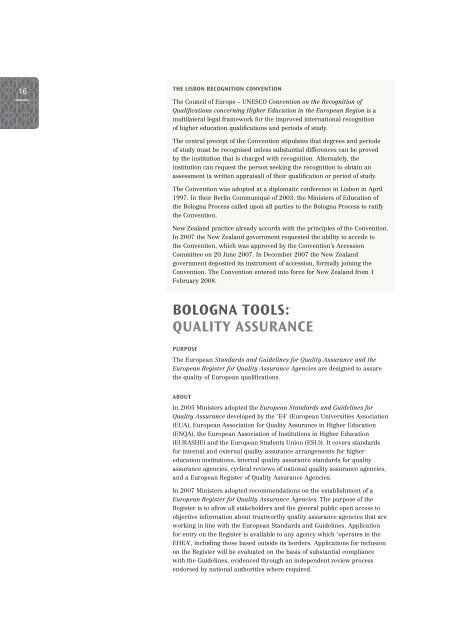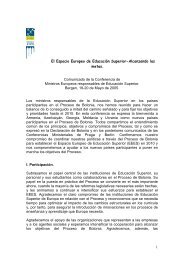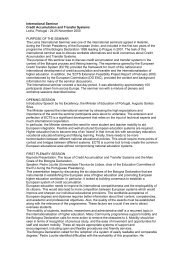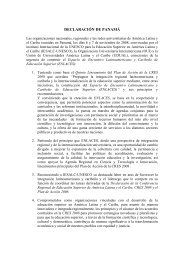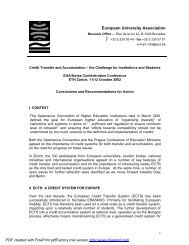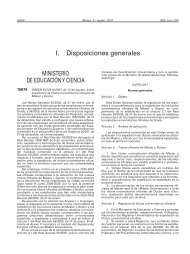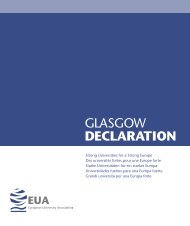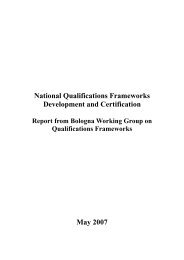New Zealand and the Bologna Process
New Zealand and the Bologna Process
New Zealand and the Bologna Process
Create successful ePaper yourself
Turn your PDF publications into a flip-book with our unique Google optimized e-Paper software.
16 The Lisbon RECOGNITION ConventionThe Council of Europe – UNESCO Convention on <strong>the</strong> Recognition ofQualifications concerning Higher Education in <strong>the</strong> European Region is amultilateral legal framework for <strong>the</strong> improved international recognitionof higher education qualifications <strong>and</strong> periods of study.The central precept of <strong>the</strong> Convention stipulates that degrees <strong>and</strong> periodsof study must be recognised unless substantial differences can be provedby <strong>the</strong> institution that is charged with recognition. Alternately, <strong>the</strong>institution can request <strong>the</strong> person seeking <strong>the</strong> recognition to obtain anassessment (a written appraisal) of <strong>the</strong>ir qualification or period of study.The Convention was adopted at a diplomatic conference in Lisbon in April1997. In <strong>the</strong>ir Berlin Communiqué of 2003, <strong>the</strong> Ministers of Education of<strong>the</strong> <strong>Bologna</strong> <strong>Process</strong> called upon all parties to <strong>the</strong> <strong>Bologna</strong> <strong>Process</strong> to ratify<strong>the</strong> Convention.<strong>New</strong> <strong>Zeal<strong>and</strong></strong> practice already accords with <strong>the</strong> principles of <strong>the</strong> Convention.In 2007 <strong>the</strong> <strong>New</strong> <strong>Zeal<strong>and</strong></strong> government requested <strong>the</strong> ability to accede to<strong>the</strong> Convention, which was approved by <strong>the</strong> Convention’s AccessionCommittee on 20 June 2007. In December 2007 <strong>the</strong> <strong>New</strong> <strong>Zeal<strong>and</strong></strong>government deposited its instrument of accession, formally joining <strong>the</strong>Convention. The Convention entered into force for <strong>New</strong> <strong>Zeal<strong>and</strong></strong> from 1February 2008.BOLOGNA TOOLS:QUALITY ASSURANCEPurposeThe European St<strong>and</strong>ards <strong>and</strong> Guidelines for Quality Assurance <strong>and</strong> <strong>the</strong>European Register for Quality Assurance Agencies are designed to assure<strong>the</strong> quality of European qualifications.AboutIn 2005 Ministers adopted <strong>the</strong> European St<strong>and</strong>ards <strong>and</strong> Guidelines forQuality Assurance developed by <strong>the</strong> ‘E4’ (European Universities Association(EUA), European Association for Quality Assurance in Higher Education(ENQA), <strong>the</strong> European Association of Institutions in Higher Education(EURASHE) <strong>and</strong> <strong>the</strong> European Students Union (ESU)). It covers st<strong>and</strong>ardsfor internal <strong>and</strong> external quality assurance arrangements for highereducation institutions, internal quality assurance st<strong>and</strong>ards for qualityassurance agencies, cyclical reviews of national quality assurance agencies,<strong>and</strong> a European Register of Quality Assurance Agencies.In 2007 Ministers adopted recommendations on <strong>the</strong> establishment of aEuropean Register for Quality Assurance Agencies. The purpose of <strong>the</strong>Register is to allow all stakeholders <strong>and</strong> <strong>the</strong> general public open access toobjective information about trustworthy quality assurance agencies that areworking in line with <strong>the</strong> European St<strong>and</strong>ards <strong>and</strong> Guidelines. Applicationfor entry on <strong>the</strong> Register is available to any agency which ‘operates in <strong>the</strong>EHEA’, including those based outside its borders. Applications for inclusionon <strong>the</strong> Register will be evaluated on <strong>the</strong> basis of substantial compliancewith <strong>the</strong> Guidelines, evidenced through an independent review processendorsed by national authorities where required.


